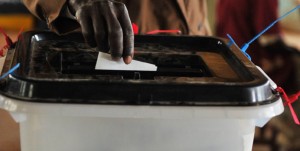
Written By Leonard Wanyama
For any practitioner of scenarios methodology, the Kenya 2013 General Election: 7 Point Minimum Scenarios by political scientist, Mutahi Ngunyi is – in an intellectual sense – extremely disappointing. His premise being that based on the numerical strength of ethnic groups as registered under the biometric voter system one of the political coalitions contesting the Kenyan elections would win in the first round. By purporting that predictive hypotheses are scenarios, Ngunyi debases a methodology that has gained considerable credibility in the provision of solutions that tackle the myriad problems in Kenya.
Instead, what Ngunyi’s analysis does is forecast what his views are on the state of affairs in the country. Therefore, his predictions cannot be taken as a scientific position but an institutional opinion of The Consulting House that he runs. The difference between a forecast and a scenario is that the former is based purely on an understanding of the past. This is the basis of the argument for Mr. Ngunyi’s ‘Tyranny of Numbers’. On the other hand, scenarios understand the present and future as far too complex to be limited to the past because history does not necessarily carry on into the future.
While scenarios recognize that past events and forces determine how the present is shaped, the methodology combines this information with accurate research in order to broaden our attention beyond our usual assumptions. A scenarios building process must then rehearse this combined knowledge in the present to tell us about the future.
Unlike the opinion pollsters who have told us the sample size and spread of their research, The Consulting House does not divulge who was involved in the exercise and what their motivation was. Additionally, Ngunyi does not clearly explain the justification for the dimensions of plausibility in his predictions.
In his analysis, Ngunyi’s facts are simplistic assumptions that reduce Kenyans to rabidly tribalistic and incapable of making considerations other than those of their respective communities. They are generalizations that do not consider there are emerging class distinctions, rural-urban considerations, and educational variations, which must be included in any credible scenarios process. This is because these are existing realities.
The pillars of his premise are shaky on a number of fronts. First, his ‘fact’ that we vote as tribes is an assumption. So is the perspective that the election was won during the voter registration no election was held that day and H.E. Mwai Kibaki is still the President of the Republic of Kenya. Mutahi’s inclination for ‘mind coups’ must be criticized due to their lack of benefit. It is especially exasperating that when asked the difficult questions concerning his postulations he retreats behind his beloved ‘cautionary’ statement of how “it must be noted that this is just a hypothesis”. This is especially so, because insinuations of such gravity must be proven.
Secondly, he does not demonstrate the plausibility of a runoff; rather he dwells only on its possibility. Plausibility, the reasonable expectation of an occurrence, has to be definitively shown for any credible scenarios process. An analysis of this magnitude cannot be conducted sentimentally.
Considering the turnout during the nominations, it doesn’t make sense that he expects the voter turnout during the general election to be low and that on this assumption he can determine which position each candidate will hold in the event of a runoff. Lastly, Ngunyi’s recommendations are based on his own personal outlook rather than his own findings of the so called ‘simulations’ he carried out. I suspect it is because in his words they are based on theory that tribal voting is a ‘solid’ historic point of reference.
In an attempt to provide a scientific counter narrative to the one provided by opinion pollsters, Ngunyi is either consciously or unconsciously locked in using the old suppositions that Kenyans only respond in primordial terms to the ethnic call of loyalty. Thus, he surprisingly joins the bandwagon of people who are dying to push the argument that because of the ethnic composition of our country, we are unable to make even the most basic of institutions or processes work.
In an article a few weeks back, columnist Charles Onyango-Obbo captured the sentiments of a Kenyan who said that it is lazy political science to say that all Kikuyus’ will vote for Uhuru Kenyatta of The National Alliance (TNA), all Luos’ will vote for Raila Odinga of the Orange Democratic Movement (ODM), all Kalenjins’ will vote for United Republican Party (URP) or all the Kambas’ will vote for Wiper Democratic Movement (WDM) candidates and in extension the presidential contenders of their respective coalitions. Does such opinion count for nothing? By restricting himself to tribal political analysis, Ngunyi takes the easy way out and locks us in “…the (negative) beauty, powerful seduction, convenience, and neatness of analyzing…” Kenya.
We must stress a high degree of honesty and integrity from not only our politicians but our public intellectuals as well. Kenya needs less analysis of this caliber that reduces our every decision to tribal basis and its associated calculus.
Leonard Wanyama works for the Society for International Development (SID) in Nairobi and is a graduate of International Relations from the University of the Witwatersrand.

